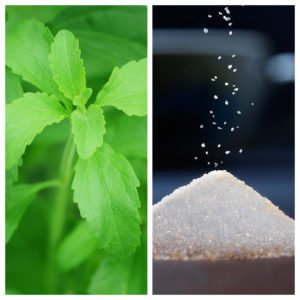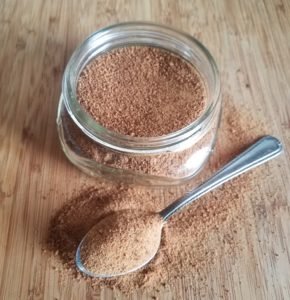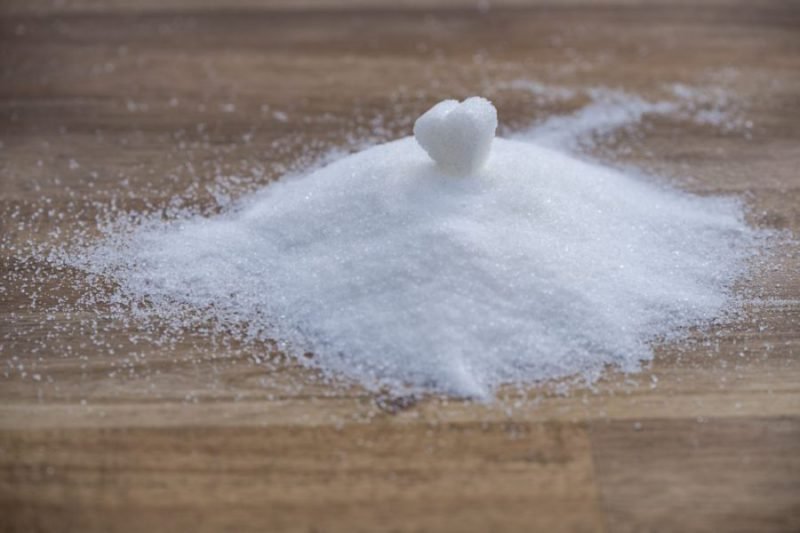This post may contain affiliate links. Please read my disclaimer for more information.
I have struggled with weight over the course of my adult life, and being fond of all things chocolate has not helped me on that journey at all! Diabetes is prevalent in my family, and I am determined not to become its next victim. Yet, I still love eating chocolate sweets so I had to look for alternatives that will allow me to have my cake and eat it too. 🙂
Fortunately, I love a challenge and so I set about searching for the perfect sweeteners to serve as substitutes in all my baking and cooking applications. The sweeteners I found serve as perfect sugar alternatives for diabetics, low-carbers and those following the Keto and Paleo diets.
Just as you can have various types of sugar for different recipes, so too are there varieties of sugar-free sweeteners. I’ll go through a list of suitable substitutes for diabetics as well as those interested in using less refined white sugar in their diets. This list will first focus on the completely sugar-free sweeteners and end with one real sugar alternative.
Monk Sweet+ with Stevia
This is by far my favorite sugar substitute! In the multifaceted world of sugar-free sweeteners, this one is the absolute best in my opinion, because using this product is almost the same as using real sugar. It’s twice as sweet as sugar so you’d use half as much of the required amounts in a recipe.
Steviva MonkSweet with Stevia is comprised of erythritol (sugar alcohol), monk fruit extract, and stevia extract. Erythritol is a very common sugar substitute and is present as a bulking agent in almost every artificial sweetener out there. It has a slight cooling effect on the palate and is difficult to dissolve in liquid. Monk fruit and stevia are well-known plants that contain calorie-free sweetening compounds.
Stevivia Brand, the company that produces Monk Sweet+ with Stevia somehow managed to combine these three common sugar alternatives to exquisite perfection.
Pros
You can use Monk Sweet+ with Stevia to sweeten almost anything including:
- Cookies/Cakes
- Mousses & Purees
- Homemade Sugar-free Maple Syrup
- Beverages (hot or cold)
Cons
In all honesty, I’m hard-pressed to find anything negative to say about this sugar alternative. Although it’s a fine powder, it can be slightly grainy in some applications. I solve this problem by pulverizing it in a Magic Bullet blender. This makes any lingering grittiness disappear and enhances the enjoyment of whatever you’re making.
Stevia

In case you don’t know what stevia is, here’s a blurb from Wikipedia:
“Stevia (/ˈstiːviə, ˈstɛviə/)[1][2] is a sweetener and sugar substitute extracted from the leaves of the plant species Stevia rebaudiana, native to Brazil and Paraguay. The body does not metabolize the glycosides in stevia and therefore it contains 0 calories like some artificial sweeteners. Stevia’s taste has a slower onset and longer duration than that of sugar, and some of its extracts may have a bitter or licorice-like aftertaste at high concentrations.”
Stevia is among the top choices of sugar alternatives for diabetics. It’s available in liquid or powder form. The liquid form may contain alcohol or glycerin for the alcohol-free version. The powder form sometimes contains fillers so read the label to ensure you’re getting only pure stevia extract.
The liquid and powdered forms of stevia are mostly used in beverages, hot or cold, as it works very well to sweeten liquids. With stevia, you have to find the perfect amount for your palate – too little and you won’t taste any sweetness, too much and you get a bitter aftertaste. I like Trader Joe’s and NOW Better Stevia Liquid Extract brands.
Pros
- Effectively sweetens any kind of liquid
- Calorie-free
- Does not affect blood sugar levels
- Has no negative gastric side effects
Cons
- Some brands have a bitter after-taste
- Not good for sweetening baked goods. Results in a bitter taste when used in cakes, cookies, etc.
Inulin

Another great sugar alternative for diabetics, inulin is a prebiotic fiber that is usually derived from plants, most notably chicory and Jerusalem artichokes. It doesn’t raise blood sugar levels, so it’s the perfect sugar alternative for diabetics. Per Wikipedia:
“Inulins are a group of naturally occurring polysaccharides produced by many types of plants,[1] industrially most often extracted from chicory.[2] The inulins belong to a class of dietary fibers known as fructans. Inulin is used by some plants as a means of storing energy and is typically found in roots or rhizomes. Most plants that synthesize and store inulin do not store other forms of carbohydrate such as starch.”
I was very impressed the first time I used inulin. I purchased a brand called Chocoperfection and used it in baking recipes as well as for beverages. It does have a serious drawback that prevents me from ranking it at the top with Monk Sweet+ with Stevia. I’ll get into that a bit more below.
Pros
- Perfect 1:1 substitute for sugar
- Doesn’t raise blood sugar levels
- Keeps you feeling full longer
- Reduces sugar cravings
Cons
- May cause gastric distress (gas, cramping, bloating, more frequent bms, etc.)
If you’re like me and among the few people who are affected by inulin’s side effects, this may not be the sugar substitute choice for you. It’s a bummer because it’s an otherwise excellent sweetener.
Coconut Sugar

I placed coconut sugar at the end of this list, well because it’s sugar. Sugar is sugar, no matter what type we’re discussing. Coconut sugar is derived from the sap of the coconut flower. Here’s Wikipedia’s description:
“Coconut sugar (also known as coco sugar, coconut palm sugar, coco sap sugar, or coconut blossom sugar) is a palm sugar produced from the sap of the flower bud stem of the coconut palm.[1]
Other types of palm sugar are made from the Palmyra palm, the date palm, the sugar date palm, the sago palm, or the sugar palm. Used as a sweetener in many countries, coconut sugar has no significant nutritional or health benefits over other sweeteners.”
There are a few benefits to using coconut sugar that make it a better alternative for diabetics – it has a very low glycemic index. This means that it will not raise your blood sugar levels as much as it would if you used regular sugar.
Coconut sugar is also delicious. When I want a bit more depth of flavor in my dessert recipes, I may substitute part of the sweetener with coconut sugar.
Pros
- Low glycemic index
- Mineral-rich (normal sugar has empty calories)
- Fiber-rich
- Adds rich caramel flavor to foods
- Unrefined
Cons
- High in calories, the same as regular sugar. Compromise by diluting with another sugar substitute like inulin or monk sweet+ with stevia.
Best Sugar Alternatives & Substitutes
In addition to the sweeteners I’ve mentioned above, I am including some bonus recommendations that fit the criteria of being sufficiently sweet, filler-free, appropriate for diabetics, and for many other diets including keto and paleo.
Other Sugar Alternatives
- Lakanto – a blend of erythritol and monk fruit suitable for baking
- Xylitol – a granular sugar alcohol that is best used powdered and in hot liquids
- Yacon syrup – prebiotic fiber and has a third of the calories of regular sugar
I hope I have demonstrated that finding sugar alternatives for diabetics is easier than it has ever been. I recommend you try out some of the ones I’ve mentioned in this article to find the one(s) that fit with your lifestyle and way of eating.
Let me know which ones work best for you in the comments. Happy Eating!




I can totally relate to your love of chocolate I have to have a little bit every day, but that little bit usually means a little bit more. 🙂 I find with chocolate if I have dark it helps a bit…or maybe I am just deceiving my self.
I really loved this article I didn’t realize there were other healthy alternatives than straight Stevia. I can only handle a pinch of it at a time. So thank you for the suggestions.
The Monk Sweet sounds interesting I had never heard of it and I like the idea of coconut sugar on the low glycemic index.
Thank you
Hi Rose,
Thank you for your kind words! Yes, do try the monk sweet plus with stevia. It’s absolutely divine for baking or any other sugar-free sweetening you need. I’ll be providing more recommendations on the site, so be sure to check back from time to time for more valuable info.
Take care!
Dawn